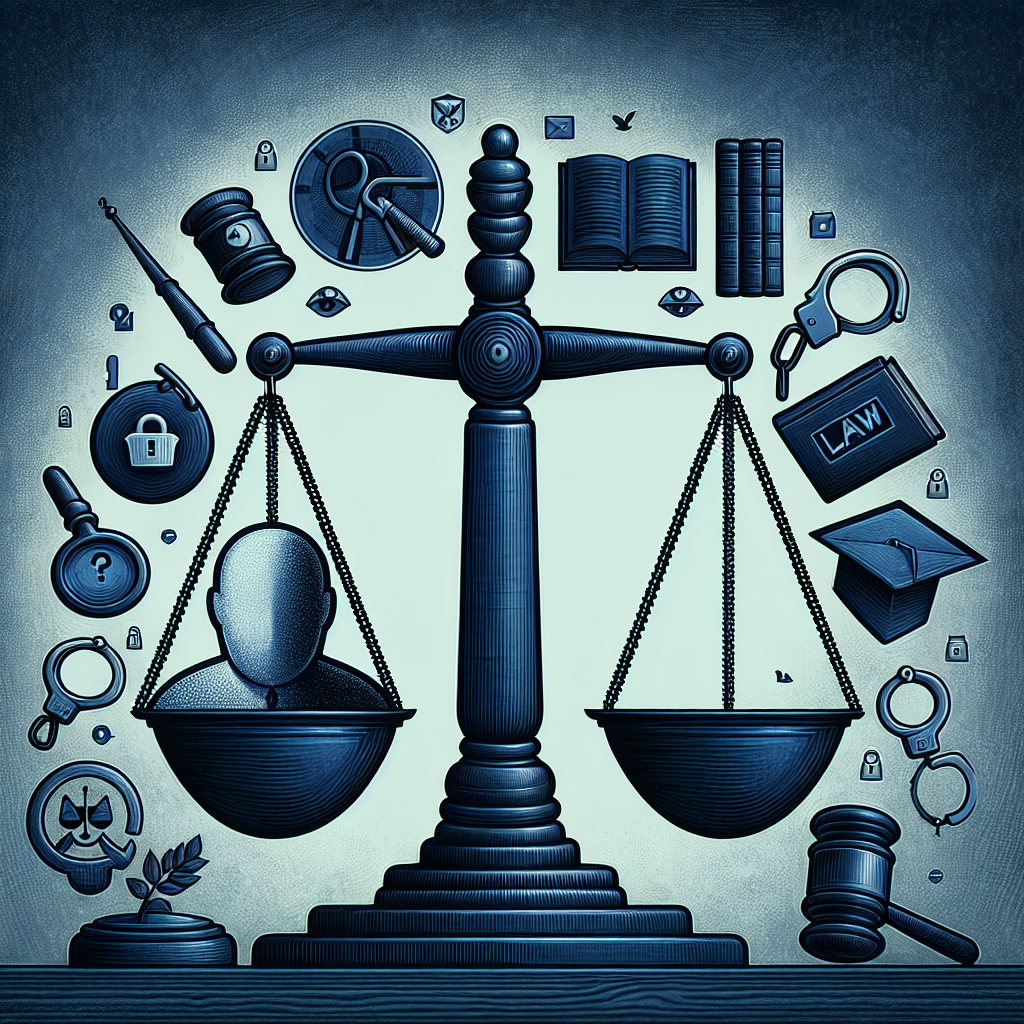
Introduction
Criminal profiling has long been a controversial yet fascinating aspect of law enforcement and criminal justice. It promises insights into the minds of offenders, helping investigators track down suspects with unprecedented speed and efficiency. However, the increasing reliance on these techniques raises significant questions about privacy, ethics, and the very nature of justice. In a world where technology is making personal data more accessible than ever, the ethics of criminal profiling serves as an essential dialogue on balancing justice with individual rights. This article delves into The Ethics of Criminal Profiling: Balancing Justice with Privacy Concerns, exploring its implications through real-world examples and research, while encouraging a thoughtful approach to a multifaceted issue.
Understanding Criminal Profiling
What is Criminal Profiling?
Criminal profiling is a method used by law enforcement agencies to identify potential suspects based on behavioral patterns, characteristics, and other psychological factors. Profilers analyze crime scenes, victimology, and offender behaviors to create a picture of the likely suspect. While it can be a valuable tool for narrowing down suspects in complex cases, the nuances involved bring forth ethical concerns about privacy, consent, and civil liberties.
Types of Criminal Profiling
- Crime Scene Profiling: Analyzes physical evidence from the crime scene.
- Behavioral Profiling: Focuses on predicting the behaviors of potential criminals.
- Psychological Profiling: Examines the psychological state of the offender based on previous offenses and patterns.
The Evolution of Criminal Profiling
Historical Context
From its early inception in the 19th century with criminal psychologist Cesare Lombroso, profiling has evolved alongside technology. The rise of databases, artificial intelligence, and big data analytics has significantly transformed how profiling is conducted. This change begs the question: How do these advancements impact ethical considerations regarding privacy law?
Case Study: The Unabomber
The case of Ted Kaczynski, also known as the Unabomber, showcases the potential success of criminal profiling. Through the analysis of his letters and bombings, profilers were able to identify patterns that led to his capture. However, the methods used to gather information and the resulting invasions of privacy still spark heated debates over the acceptable limits of profiling.
The Ethical Framework Behind Profiling
Legal Perspectives
In discussing The Ethics of Criminal Profiling: Balancing Justice with Privacy Concerns, it’s essential to explore the legal frameworks that govern profiling. The Fourth Amendment of the U.S. Constitution protects individuals against unreasonable searches and seizures, raising questions about the methodologies used in profiling.
Privacy Laws and Judicial Precedent
Several cases have shaped the legal landscape surrounding privacy and profiling. For instance, Carpenter v. United States established the need for warrants to access cell phone location information. This underscores the importance of obtaining consent and reinforces the ethical obligation to respect individuals’ privacy rights.
Ethical Theories
Utilitarianism: Consider the greatest good for the greatest number. This theory often supports the use of profiling as it can help prevent crimes and catch offenders quickly.
Deontology: Focuses on the moral duty to respect individual rights. From this perspective, the invasion of data privacy for the sake of criminal profiling may be viewed as unethical.
- Virtue Ethics: Encourages the cultivation of moral character. Ethical profiling would require compassion, fairness, and respect for all individuals involved.
Balancing Justice with Privacy Concerns
The Role of Technological Advancements
With the rise of artificial intelligence and machine learning, the ability to perform complex behavior analyses has grown exponentially. However, these technologies also harvest massive amounts of personal data, raising privacy flags.
Table 1: Technological Advancements in Criminal Profiling
| Tech Type | Benefits | Privacy Concerns |
|---|---|---|
| AI Algorithms | Quick identification of suspects | Risk of data breaches and misuse |
| Social Media Analysis | Insight into suspect behaviors | Surveillance and tracking without consent |
| Facial Recognition | Identifying individuals in public spaces | Potential for racial bias and wrongful accusation |
Case Study: The Golden State Killer
The arrest of Joseph DeAngelo, known as the Golden State Killer, shed light on the ethics of criminal profiling. Authorities utilized genetic genealogy to match DNA from crime scenes with familial DNA from public ancestry databases. While this led to justice for countless victims, it also ignited widespread public fear regarding genetic privacy and consent.
Implications for Law Enforcement Practices
Training and Guidelines
For profiling to be both effective and ethical, law enforcement agencies should employ clear guidelines and training protocols. Implementing ethical training ensures that officers are aware of the critical balance between investigative needs and citizen rights.
Stakeholder Involvement
Collaboration between law enforcement, ethicists, and the public could lead to better models of governance. Public forums, centered around The Ethics of Criminal Profiling: Balancing Justice with Privacy Concerns, can democratize discussions surrounding profiling, ensuring that it is not a tool misused due to a lack of oversight.
The Public Perspective: Trust in Law Enforcement
Community Engagement
Building trust between the community and law enforcement is vital for effective criminal profiling. Open dialogues on The Ethics of Criminal Profiling: Balancing Justice with Privacy Concerns can help demystify the motives behind profiling and bolster community confidence.
Transparency and Accountability
Encouraging transparency in the methodologies used for profiling can enhance public trust. Community stakeholders should be involved in discussions so that ethical standards are established collaboratively and consensually.
The Future of Ethical Profiling
Recommendations for Practice
- Establish Clear Guidelines: Set regulations that delineate acceptable profiling methods.
- Engage the Public: Foster community discussions about ethical implications.
- Utilize Independent Oversight: Have external bodies monitor profiling practices for fairness.
The Role of Academia
Research institutions can play a pivotal role in shaping the future of ethical criminal profiling. By conducting studies that explore the effectiveness and ethical ramifications of various profiling practices, academia can provide vital insights into crafting ethical frameworks.
Conclusion
As technology continues to evolve, so too must our ethical considerations surrounding the issues in The Ethics of Criminal Profiling: Balancing Justice with Privacy Concerns. Finding this balance is not merely a legal dilemma but a moral imperative. Society must engage proactively in discussions that ensure that justice does not infringe upon the fundamental rights of its citizens. By implementing fair practices, fostering transparency, and involving all stakeholders, we can harness the potential of profiling without compromising individual privacy rights.
FAQs
1. What is criminal profiling?
Criminal profiling involves assessing an offender’s behaviors, patterns, and psychological traits to identify potential suspects.
2. Why are privacy concerns significant in criminal profiling?
Due to the intrusive nature of gathering personal data for profiling, many feel their rights could be violated, leading to potential misuse.
3. Are there laws that protect individuals from unethical profiling?
Yes, various privacy laws, including the Fourth Amendment, govern how personal data can be collected and used by law enforcement.
4. What are the ethical theories surrounding criminal profiling?
Utilitarianism, deontology, and virtue ethics are some of the ethical frameworks that analyze the justification for criminal profiling practices.
5. How does community trust play a role in profiling’s effectiveness?
Building community trust is essential for effective policing and criminal profiling as it ensures cooperation and transparency between law enforcement and the public.
This comprehensive exploration of The Ethics of Criminal Profiling: Balancing Justice with Privacy Concerns not only highlights the complexities involved but also empowers readers to reflect on their roles in these critical discussions.















